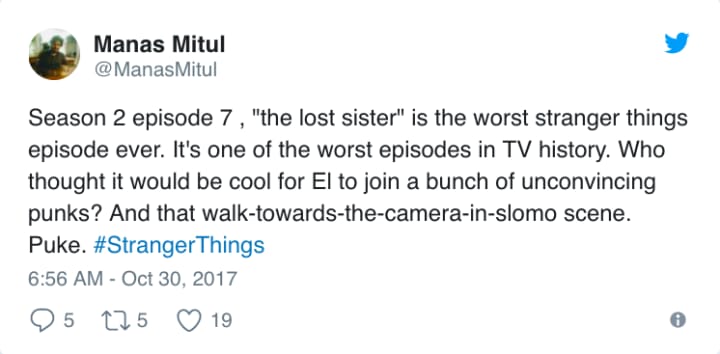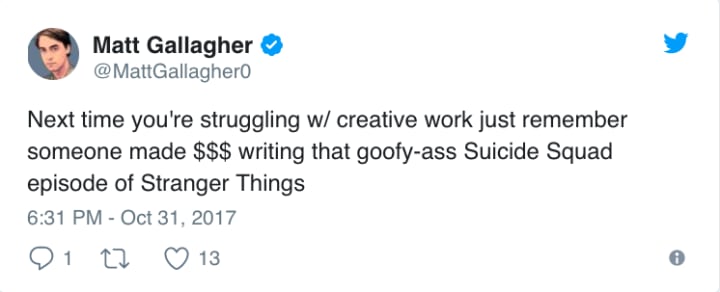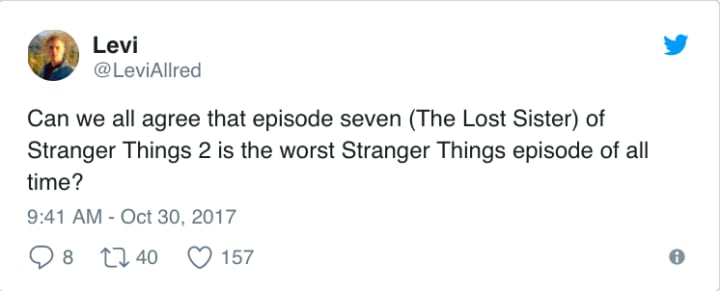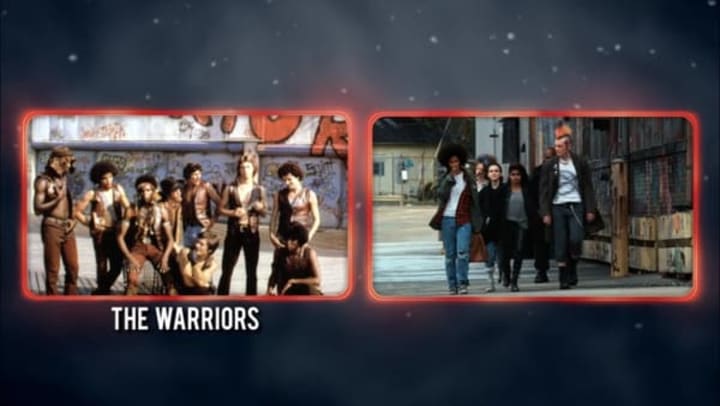
The first season of Stranger Things quickly became a cult classic, and the second has reinforced that status. As much as fans may be thrilled to return to this nostalgic horror series, though, there's one episode that's inspired heated debate. Episode 7, "The Lost Sister," is like nothing we've ever seen in Stranger Things before. As a result, some reactions have been pretty strong.

Image via Twitter

Image via Twitter

Image via Twitter
Is "The Lost Sister" really so bad? Or is it actually an essential part of the story, one that needed to be there to shape the future of the series?
The Core Concept
Let's start by imagining Season 2 without "The Lost Sister." The overarching narrative would be simple: Things get bad, until Eleven leaves the cabin and saves the day. Needless to say, the writers quickly realized that this wouldn't work. Instead, they decided that Eleven had to go on a journey of discovery in order to get to the point where she was actually able to save the day.
The basic narrative is inspired by Luke Skywalker's in The Empire Strikes Back. It sends Eleven off on a quest of her own, a side-story that forces her to work out just what kind of person she truly is. This question of self-identity is the fundamental driving force of the episode, not the matter of how Eleven taps into her powers.

Intriguingly, "The Lost Sister" answers this question by subverting The Empire Strikes Back. Where Luke headed out to Yoda, Eleven meets Kali. And the Duffers use clever symmetry to immediately tell the viewers that Kali is a future antagonist and opponent, rather than an ally and mentor. Like Eleven, she has a group of four gathered around her. Unlike Eleven, these seem less like friends and more like members of a cult, with Kali as the leader. Kali has even chosen a given name derived from a Hindu goddess who destroys forces of evil. This, she indicates, is what she believes she stands for. This is the cause around which she gathers her followers.
So, for all Kali will indeed serve the role of Yoda in forcing Eleven to confront questions of power and identity, she's also a smart subversion of that concept. As a result, we can expect to see a lot more of Kali going forward.
Speaking to Entertainment Weekly, Matt Duffer noted:
"Whether it works for people or not, it allows us to experiment a little bit. It’s important for Ross and I to try stuff and not feel like we’re doing the same thing over and over again. It’s almost like doing a whole little other pilot episode in the middle of your season, which is kind of a crazy thing to do. But it was really fun to write and cast and work on."
This quote's a fascinating one, and many fans have taken it to mean that the Duffer brothers are contemplating a spinoff of some kind. In a later interview with CinemaBlend, they insisted that's not the case. Instead, the goal was "expanding the universe and the world a little bit."
It's important to realize that Kali is a significant character, and a potential future villain. It's uncertain who would actually win if she and Eleven had to actually fight it out, which is exciting; by the end of Season 2, Eleven has enough power to both open and close gateways to the Upside-Down, and there's not much out there that could actually prove to be a threat to her. Kali, however, can effortlessly cloud her mind with visions, and use them to manipulate Eleven with ease.
The mixed reaction to "The Lost Sister" suggests that the Duffers will need to tread carefully as regards Kali's future direction. While the crew had a lot of fun creating locations and characters, moving from Hawkins to a fairly cliched vision of '80s Chicago didn't really work. What's more, Kali's gang — inspired by pop groups from the '80s — weren't developed enough as characters to hold our interest.

'Beyond Stranger Things' shows the homages. [Credit: Netflix]
Kali's existence raises intriguing questions about other possible Hawkins children. While we can assume some of Dr. Brenner's initial experiments were unsuccessful, by the time he got to Eight, he had identified children with real power. So what happened to Nine and Ten? And is Eleven actually the last of his experiments, or could there be a Twelve, a Thirteen or even a Fourteen out there?
Matters have been made all the more interesting given the revelation that Brenner is actually alive, so could still be working with other children he'd abducted and experimented on.
The Crucial Difference Between Kali And Eleven
Now let's focus in on the last scene between Kali and Eleven, as Eleven chooses to return to Hawkins. Kali warns her that her friends will not save her, but Eleven responds that perhaps she can save them. That one brief piece of dialogue sets up the crucial difference between Kali and Eleven.
To Kali, others exist in terms of the good they can do for her. It's all about whether people can "save" her. Eleven, however, will choose to act for the good of others. She doesn't return to Hawkins because she needs to, but because she becomes aware that the ones she loves need her to.
It's a subtle, but important, distinction. For all Kali may fancy herself as the destroyer of evil, in truth her motivation is simply revenge. Her cause is all about venting her own anger and rage, and that's all she can teach Eleven — to tap into her pain, and so release her powers. In this sense, again, Kali is the anti-Yoda. (Yoda would insist that anger is of the dark side, and would argue that a true hero must abandon self-absorption.)
"The Lost Sister" doesn't suggest that Eleven forgives the past. Instead, she will no longer allow it to define her. She won't leave children without a father, she won't abandon her friends to the Mind Flayer, and she won't view people as nothing more than a means to her end. Tellingly, the episode closes with Eleven realizing that she's going home.
"The Lost Sister" isn't a perfect episode, but it is an essential one. It gives the Duffer brothers an opportunity to experiment with different ideas, to see how fans react to them, and then to allow them to shape the show's future. Most importantly, Kali isn't a minor character. With the Mind Flayer still watching our world, the fact that other children possess psychic power is one that should terrify Eleven.
[Source: CinemaBlend, Entertainment Weekly]
About the Creator
Tom Bacon
A prolific writer and film fan, Tom has a deep love of the superhero genre.






Comments
There are no comments for this story
Be the first to respond and start the conversation.